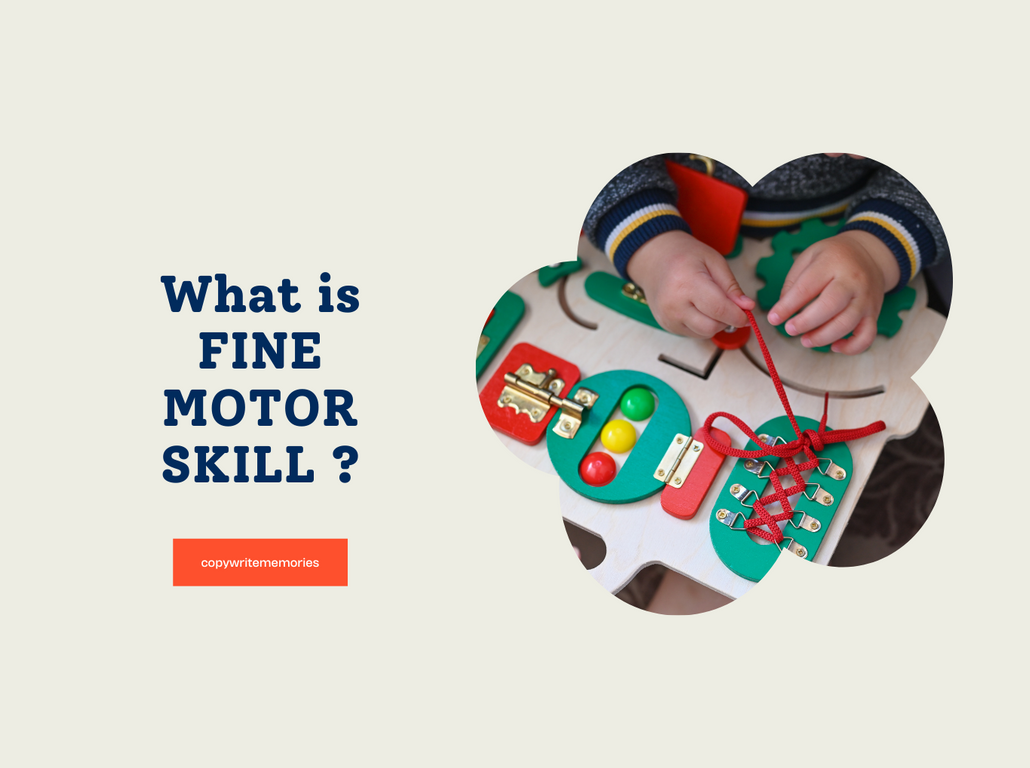
What is fine motor skills?
Fine motor skills is ability to the use of the smaller muscle of a child’s body, like the hands and wrists. These movements come so naturally to most people that we usually don’t think about them. Fine motor skills are complex, however. They involve the coordinated efforts of the brain and muscles.
WHY ARE THEY IMPORTANT?
Fine motor skills aren’t specific learning skills like reading or math are. But they directly impact how well kids are able to learn and show what they know.
Fine motor skills are essential for performing everyday skills as well academic skills. Without the ability to complete these every day tasks, a child’s self esteem can suffer, their academic performance is compromised and their play options are very limited. They are also unable to develop appropriate independence in ‘life’ skills (such as getting dressed and feeding themselves) which in turn has social implications not only within the family but also within peer relationships.
Kids need to use fine motor skills to do many school-related tasks. These include:
- Holding a crayon or pencil
- Drawing pictures and writing neatly
- Stacking blocks and stringing beads
- Using scissors, rulers, and other tools
How can you tell if a child has fine motor skill difficulties at a glance?
- Avoidance and/or disinterest of fiddly finger skills
- Preferring physical activity (again to avoid sit down tasks)
- Interest in ‘passive’ activities such as watching TV or IPAD that don’t require Fine Motor skills
- No interest in pencil or scissors skills
- Being ‘bossy’ in play and and asking others to “draw a cat for me”
- Not persisting in the face of a challenge (e.g. asking parents to fix a problem without physically trying to fix it themselves)
- Waiting for parents to dress them or clean their teeth rather than trying themselves
ACTIVITIES TO IMPROVE FINE MOTOR SKILL
1. Play-dough/Goop/Kinetic sand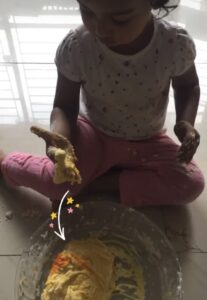
- Goop– As early as 6-12 months a baby enjoys playing and feeling(called as sensorial activities), another way to encourage fine motor skills activity could be make a goop with your child. With basic things available at home like atta(whole wheat), or maida(flour), add in water, lots of water to make it mushy and slimy and let the babies feel through the slimy goop and wiggle their fingers in.
- Sand-pit time-Have them wiggle through kinetic sand at home, or make a sand pit area for them to feel sand sift through their fingers, having them pick up and fill jars are great fine motor skill acitivity.
- Play dough are excellent activity you can have your older children (4-7yrs) make at home themselves, its non-toxic, edible, DIY activity they can engage themselves into. For younger ones (1yr onwards) Encourage your child to squeeze, stretch, pinch and roll “snakes” or “worms” with the play clay. You can even have your child try to cut the play-dough with scissors.
- Slime are fun things to invest on too.Though it might be highly recommendable to not re-use for a long time for hygienic purposes.
2. Painting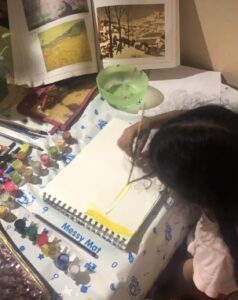
Different types of painting can help strengthen your child’s hand-eye coordination and manual dexterity.
- Finger painting gives kids an opportunity to use their hands — and to get messy.
- Painting with a brush helps kids learn to hold a brush and gain greater control using it as a tool. For younger kids, always make sure to give them big brushes, something they can easily hold and scribble through and the sizes can keep shorter and thiner with age.
- Use different tools like, toothbrush, DIY vegetable stamps, wooden stamps, leaves, flower etc for experiencing different textures and outcomes.
3. Playing with sponges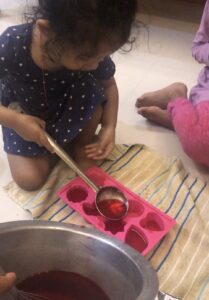
- Squeeze the sponge- A new, clean sponge, some water and two bowls are all you need for another activity to build fine motor skills. Fill a bowl with water and leave the other empty. Your child can soak the sponge in the water and then squeeze out the sponge into the other bowl. It’s a simple game that can strengthen hands and forearms.
- Clean the animals- Have some plastic animals in a bowl of water and bubble soap, in another have clean water and a dry towel- have them wash the animals and pat dry them. Its a great activity to install personal hygiene.
4. Rice races![]()
- Have a jar, muffin tray, bowl full of uncooked chickpeas, kidney beans, small balls and empty bowl, give your child small plastic/steel tweezers and grab a pair for yourself. Then, have a race to see who can be the first to transfer their items into the empty bowl using the tweezers.
- Or give different sizes of spoons to pour the items from one bowl to the other.
5. Water play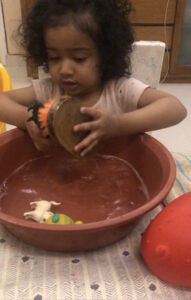
- Fill a cup about a quarter full of water. Give your child an empty cup and an eyedropper or a clean medicine syringe. Have your child try to transfer the water from one cup to the other by drawing the water into the dropper or syringe and then dropping or squirting it into the empty cup. You could also give your child more cups, add food colouring to the water, and make this a color-mixing experiment.
- Or yet again give different sizes of spoons to pour water from one bowl to the other.
6. Scissor skills
Have some time during the week to have kids work their eye/hand and fingers coordination via scissors, there are non-blade scissors available for little toddlers. That point is not for them to cut on lines or do a shape, but just use the technique of cutting and moving ahead.
7. Colouring 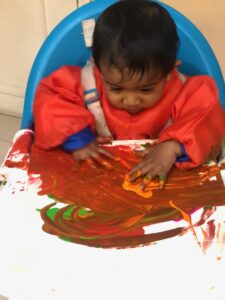
There are lot of thick colours available that given little babies a good pincer grip and therefore introduce to the idea of holding and moving their hands to color, when they see the outcome of their scribbles, it further excites them, so again even randoms circling, scribbling all over the paper is a great start.
8. Play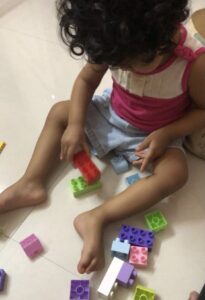
- Construction skills using lego, duplo, puzzles, train tracks
- Doll dressing and manipulation
9. Self care
- dressing – tying shoelaces, doling up sandals, zips, buttons, belts
- eating – using cutlery, opening lunch boxes and food bags
- hygiene – cleaning teeth, brushing hair etc.
10. Lacing![]()
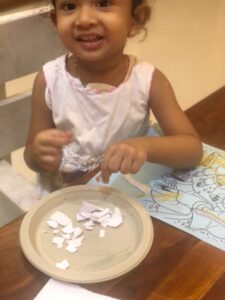
- Laminate a sheet of either letters, or favourite animals and punch through the edges and have them lace through the edges.
- Make a necklace of beads, pasta, macaroni .
These are few activities, you can go ahead and do with your kids, most of the activities mentioned here don’t need any advanced prep, or things that need to be brought, they can be set up with everyday things found at home. Though I agree most of the activity here is equivalent to complete mess making but really when else can kids be kids, wild free and messy! Kids learn a lot more what we envision. Play time is an essential part of child development!
“Play is our brain’s favorite way of learning.” – Diane Ackerman
